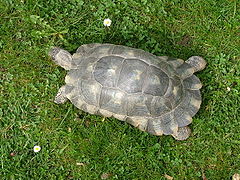Marginated Tortoise
| Marginated tortoise | |
|---|---|
 |
|
| Sardinian marginated tortoise Testudo marginata sarda |
|
| Scientific classification | |
| Kingdom: | Animalia |
| Phylum: | Chordata |
| Class: | Reptilia |
| Order: | Testudines |
| Suborder: | Cryptodira |
| Family: | Testudinidae |
| Genus: | Testudo |
| Species: | T. marginata |
| Binomial name | |
|
Testudo marginata Schoepf, 1789 |
|
| Subspecies | |
but see text |
|
| Synonyms | |
|
|
but see text
The marginated tortoise (Testudo marginata) is a species of tortoise found in Greece, Italy and the Balkans in southern Europe. It is the largest European tortoise, reaching a weight of up to 5 kg (11 lb) and a length of 35 cm (14 in). Its shell is oblong and has a notable thickness around the middle of the body. The posterior end of the shell has a saw-like formation, flanged outward like a bell. The carapaces of adult specimens are almost completely black, with yellow highlights. The front sides of the limbs are covered with large scales. The tail is notable for a lengthwise marking and for an undivided carapace over the tail. The marginated tortoise is herbivorous, and hibernates for the winter.
The marginated tortoise was formally described by German naturalist Johann David Schoepf in 1789; its specific epithet marginata is a straightforward derivation from the Latin term for 'marginated'.
The nominate subspecies is the Greek marginated tortoise, Testudo marginata marginata. Three additional subspecies of marginated tortoises have been named:
The Sardinian marginated tortoise (T. m. sarda) is the name usually used to separate the population on the island of Sardinia. These tortoises have less strongly bent tiles in the posterior of their carapaces, and the posterior of the carapace is almost smooth compared with the saw-like T. m. marginata. Clearly distinct according to morphology and entirely allopatric, it cannot be distinguished by mtDNA and nDNA ISSR sequence analysis.Lineage sorting has not occurred to a considerable degree; consequently, the more geographically isolated Sardinian population is presumably of quite recent origin.
...
Wikipedia

